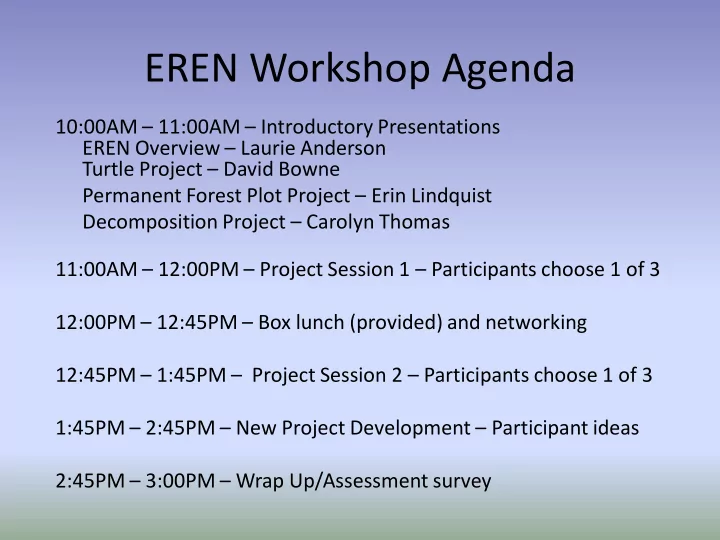

EREN Workshop Agenda 10:00AM – 11:00AM – Introductory Presentations EREN Overview – Laurie Anderson Turtle Project – David Bowne Permanent Forest Plot Project – Erin Lindquist Decomposition Project – Carolyn Thomas 11:00AM – 12:00PM – Project Session 1 – Participants choose 1 of 3 12:00PM – 12:45PM – Box lunch (provided) and networking 12:45PM – 1:45PM – Project Session 2 – Participants choose 1 of 3 1:45PM – 2:45PM – New Project Development – Participant ideas 2:45PM – 3:00PM – Wrap Up/Assessment survey
A Research Coordination Network (RCN) Funded by the NSF Research Coordination Network- Undergraduate Biology Education Program
The EREN Mission • To create a model for collaborative ecological research that generates high-quality, publishable data involving undergraduate students and faculty at primarily undergraduate institutions (PUIs)
Coordinating undergraduate research across many sites will enhance the scientific and educational value of these activities.
EREN Founders • Anderson, Laurel - Ohio Wesleyan Univ., OH* • Bowne, David - Elizabethtown College, PA • Gartner, Tracy - Carthage College, WI* • Kuers, Karen - Sewanee: The Univ. of the South, TN* • Downing, Amy - Ohio Wesleyan Univ., OH • Dosch, Jerald - Macalester College, MN • Hoopes, Martha - Mount Holyoke College, MA • Hornbach, Dan - Macalester College, MN • Johnson, David - Ohio Wesleyan Univ., OH • Lindquist, Erin - Meredith College, NC* • Machado, Jose-Luis - Swarthmore College, PA* • O’Reilly , Catherine - Bard College, NY • Pohlad, Bob - Ferrum College, VA* • Simmons, Jeffrey - Mount St. Mary’s Univ ., MD* • LoGiudice, Kathleen - Union College, NY The EREN Founders are • Shea, Kathy - St. Olaf College, MN 18 scientist-educators from • Thomas, Carolyn - Ferrum College, VA* 14 PUI institutions. • Woods, Kerry - Bennington College, VT * = Grant Co-PI
Some of EREN’s Founders meeting at Ohio Wesleyan University, March 2009
EREN now includes 53 institutions across the USA and Canada!
Specific Goals of EREN • Develop collaborative research projects among PUIs that work for scientists with significant teaching responsibilities • Enhance the roles of PUI scientists and their students in existing and emerging ecological research networks • Maximize student engagement in authentic science while generating publication quality data • Develop team-taught, continental ecology course modules using the data from the PUI network • Create an online database for the PUI network
What will EREN provide? • Models for collaborative ecological projects at PUIs • Opportunities to participate in and develop publishable collaborative projects using the EREN model • Opportunities to meet and network about collaborative research with other PUI faculty (travel funds provided) • Professional development opportunities to learn new research techniques • Protocols for integrating EREN projects into teaching • Website for PUI datasets and protocols • Note: EREN has funds only for Founder pilot projects
CHIEF Acronym for EREN Research CHIEF projects are: • Collaborative • High Impact science and education • Ecological or environmental research • Feasible for all kinds of institutions
What is EREN doing now? • Developing pilot collaborative projects to see what works for PUI faculty and students. • Testing a data sharing and authorship policy model for collaborative projects. • Inviting EREN members to use our network to find collaborators and develop collaborative grant proposals. • Today’s workshop will introduce three pilot projects for EREN members to join, and invite participants to start developing ideas for their own projects.
Example: EREN Pilot Project Underway Effects of riparian vegetation on stream temperature Lead Scientist: Dr. Jeff Simmons, Mount St. Mary’s Univ. – 12 participating institutions, in a North-South gradient from PA to NC and East-West out to British Columbia – Objective: To quantify the extent and nature of change in stream temperature regime caused by vegetated riparian zones over a wide geographic range. – Data collection began June 1, 2011 with data-loggers installed in vegetated and unvegetated stream reaches at each site.
EREN Pilot Projects Launching Today • Turtle Mark and Recapture Study (TurtlePop) • Permanent Forest Plots Project • Decomposition of invasive and native plants in terrestrial and aquatic habitats. • The PLAN: Listen to the project descriptions, choose one project session to attend before lunch, choose a second session after lunch.
EREN Workshop Agenda 10:00AM – 11:00AM – Introductory Presentations EREN Overview – Laurie Anderson Turtle Project – David Bowne Permanent Forest Plot Project – Erin Lindquist Decomposition Project – Carolyn Thomas 11:00AM – 12:00PM – Project Session 1 – Participants choose 1 of 3 12:00PM – 12:45PM – Box lunch (provided) and networking 12:45PM – 1:45PM – Project Session 2 – Participants choose 1 of 3 1:45PM – 2:45PM – New Project Development – Participant ideas 2:45PM – 3:00PM – Wrap Up/Assessment survey
Recommend
More recommend